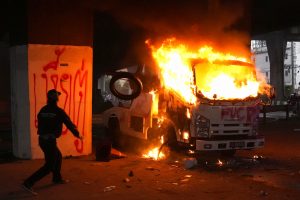Yesterday saw police in Thailand clash with anti-government protesters for a second straight day, firing tear gas, water cannon, and rubber bullets to disperse crowds calling for the resignation of Prime Minister Prayut Chan-o-cha.
The demonstrators initially planned to march to Prayut’s residence, but after the rally was called off, hundreds of people gathered in the nearby Din Daeng area. According to the Associated Press, some fired slingshots and hurled firecrackers and small explosive devices called ping-pong bombs. They also set fire to a vehicle that burned beneath an elevated roadway.
According to Reuters, which cited a police source, at least six police officers were injured during the clashes. It said one officer was shot in the leg and three others hit by shrapnel from a homemade bomb. The number of injured protesters was unclear, though videos and images posted on social media suggest the police meted out at least as much violence as they received. Meanwhile, at least six protesters were arrested for violating COVID-19 emergency rules banning public gatherings.
Yesterday’s protests followed similar gatherings that were held on Tuesday and Saturday in Din Daeng, and resulted in similar fracas with riot police. (See here for our recent photo essay on the Saturday protest.) The demonstrations have carried on the message of last year’s campaign of anti-government protests, which demanded Prayut’s resignation, a genuinely democratic constitution and – most explosively – fundamental reform of Thailand’s untouchable institution: the monarchy.
In fact, Tuesday’s protest came on the anniversary of a rally at a university campus on August 10 last year, at which young campaigners revealed a 10-point plan for the reform of the monarchy that included the abolition of Thailand’s lese majeste law, which criminalizes criticisms of monarchy or the royal family, and a reduction in the monarchy’s opaque and bloated budget.
Last year’s protests petered out under the combined pressure of COVID-19 restrictions and a concerted assault by Thai authorities, who have used the country’s lese majeste law as a cudgel against key protest leaders. As Reuters reported earlier this month, a total of 103 people have been charged under the law since the first public call for the monarchy’s reform was made a year ago. Each faces 15 years in prison for each count. Others have been charged with offenses including sedition.
The focus of the demonstrations has recently narrowed in on the country’s current COVID-19 crisis. The protesters accuse the Prayut government of mishandling the pandemic, in which Thailand has struggled to control a sharp spike in cases, accusing it of complacency and a lack of transparency in the purchase and distribution of COVID-19 vaccines.
Thailand recorded its highest daily death toll of 235 deaths on Tuesday, not long after daily reported infections breached 20,000 for the first time. Today, this rose to a new record of 22,782 cases, in addition to 147 more reported deaths.
At the same time, Thailand’s vaccine campaign has been sluggish. As of Tuesday, 23 percent of the country’s population had received at least one dose, according to the Our World In Data tracker, the fifth highest in Southeast Asia. Just 6.5 percent had received both, the region’s second lowest tally.
If this week’s protests are a sign that the flame from last year’s campaign of anti-government protests remains far from being burned out, it is equally clear that the Prayut government has little intention of ceding ground to its opponents. After yesterday’s clashes, Lt. Gen. Pakapong Pongpetra the commissioner of the Bangkok Metropolitan Police, said that the military could be called in to help quell violence at rallies if things continue to escalate.
“And in the event violence escalates and appears to get out of control, the peace-keeping operation plan will be adjusted by allowing soldiers to fortify the police’s defense against violence,” he said, according to the Bangkok Post.
While this week’s protests have been relatively small compared to last year’s mass rallies, they suggest a worrying trajectory for Thailand. The government’s now-routine use of force against demonstrators has only prompted a certain section of the anti-government protesters to respond in kind, and it is not hard to see things continuing to escalate.
“One year after the rise of youth-led democracy uprising, the prospect for compromise or reconciliation is now fading away,” Sunai Phasuk, a Thailand researcher with Human Rights Watch, told Al Jazeera. “Thailand is descending into new chaos.”

































